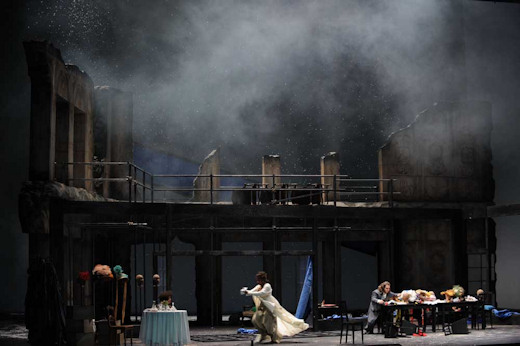Other Links
Editorial Board
- UK Editors
- Roger Jones and John Quinn
Editors for The Americas - Bruce Hodges and Jonathan Spencer Jones
European Editors - Bettina Mara and Jens F Laurson
Consulting Editor - Bill Kenny
Assistant Webmaster -Stan Metzger
Founder - Len Mullenger
Google Site Search
SEEN AND HEARD INTERNATIONAL OPERA REVIEW
O. Respighi, Marie Victoire:
Soloists, Orchester und Chor der Deutschen Oper Berlin. Conductor: Michail Jurowski, Deutsche Oper Berlin. 3.2.2011 (JMI)
Production: Deutsche Oper Berlin
Direction: Johannes Schaaf
Sets: Susanne Thomasberger
Costumes: Petra Reinhard
Lighting: Manfred Voss
Cast:
Marie de Lanjallay: Takesha Meshé Kizart
Maurice de Lanjallay: Markus Brück
Clorivière: Gastón Rivero
Simon: Simon Pauly
Cloteau: Stephen Bronk
Kermarec: Jörn Schümann
Lison/Emerantine: Martina Welschenbach
Caracalla: Gregory Warren

Production Picture © Barbara Aümuller
Ottorino Respighi (1879-1936) is one of the most important Italian composers of the first half of the last century, but better known around concert halls than in opera houses. Nonetheless he composed nine operas, of which three—La Fiamma, La Bella Adormentata nel Bosco and Re Enzo—have been performed in recent years. You can add Marie Victoire to that list now. It is the third opera written by Respighi, written about 1912/1913, but its premiere had to be cancelled due to the outbreak of World War I, and afterwards remained forgotten on the shelves of some publisher. It didn’t have its premiere until 2004 when it was produced in Rome, almost 100 years after its composition.
Following its premiere in Rome in the production of Hugo de Ana with Gianluigi Gelmetti on the podium and Nelly Miricioiu, Alberto Gazale and Alberto Cupido in the cast, the opera wasn’t picked up again until Deutsche Oper in Berlin decided to revive it in April 2009, where it has been well received by public and critics.
Marie Victoire has libretto by Edmond Guiraud, author of the original novel, and takes place during the French Revolution. The opera is full of excellent music, remarkably orchestrated (as one would expect from Resphigi), but a dearth of inspired and notable passages. It also suffers from a plot too gruesome to be credible which could well be the work’s biggest obstacle in achieving true popularity. Ian Lace relates the plot at length in this piece written for MusicWeb International.
The Deutsche Oper Berlin production bears the signature of veteran Johannes Schaaf. Sets consist of a revolving stage, very well suited for fast scene changes. Costumes roughly respond to the time of the action, difficult and they are quite attractive. I should also mention the outstanding lighting in the final scene. All the characters are well defined and the masses, particularly the choir, are handled neatly and efficiently.
The musical direction was in the hands of Michail Jurowski—father of the well-known Vladimir and Dmitry—who was also on the podium at the premiere in this house in April 2009. His reading was remarkable, with an excellent performance from the orchestra, particularly in the pure orchestral passage in the second half of Act II. Only occasionally were the voices drowned out, but that was in part to blame on those rather modest sized voices. The Choir—one of the best in the opera world—was outstanding.
The vocal cast was largely made up of members of the company who were more or less up to the challenge. Maurice Lanjallay, husband of the protagonist, was sung by baritone Markus Brück, who offered a well acted performance and a voice suited to the part. Uruguayan tenor Gastón Rivero took on the rôle of Clorivière, the royalist. He was the only new member in the cast, taking over Clorivière from German Villar who sang in the 2009 production. With his none-too-attractive voice that was not an improvement. Simon Pauly played the part of his namesake Simon, that most faithful friend to the Lanjallays also sentenced to death together with Marie, was barely audible in most of his interventions. Stephen Bronk, faithful Cloteau, made up for his poor voice by being an excellent actor.
American soprano Takesha Meshé Kizart repeated her 2009 Marie Lanjallay and she was a most convincing artist on stage. Her beautiful lyric soprano has a remarkable middle and high register and with weaknesses only near the bottom range. After a rather mediocre first act, her performance improved significantly in the prison scene which had her finishing the opera in great style. She turned out the best of the cast and is doubtlessly a soprano we’ll hear more from in the near future.
José Mª Irurzun
